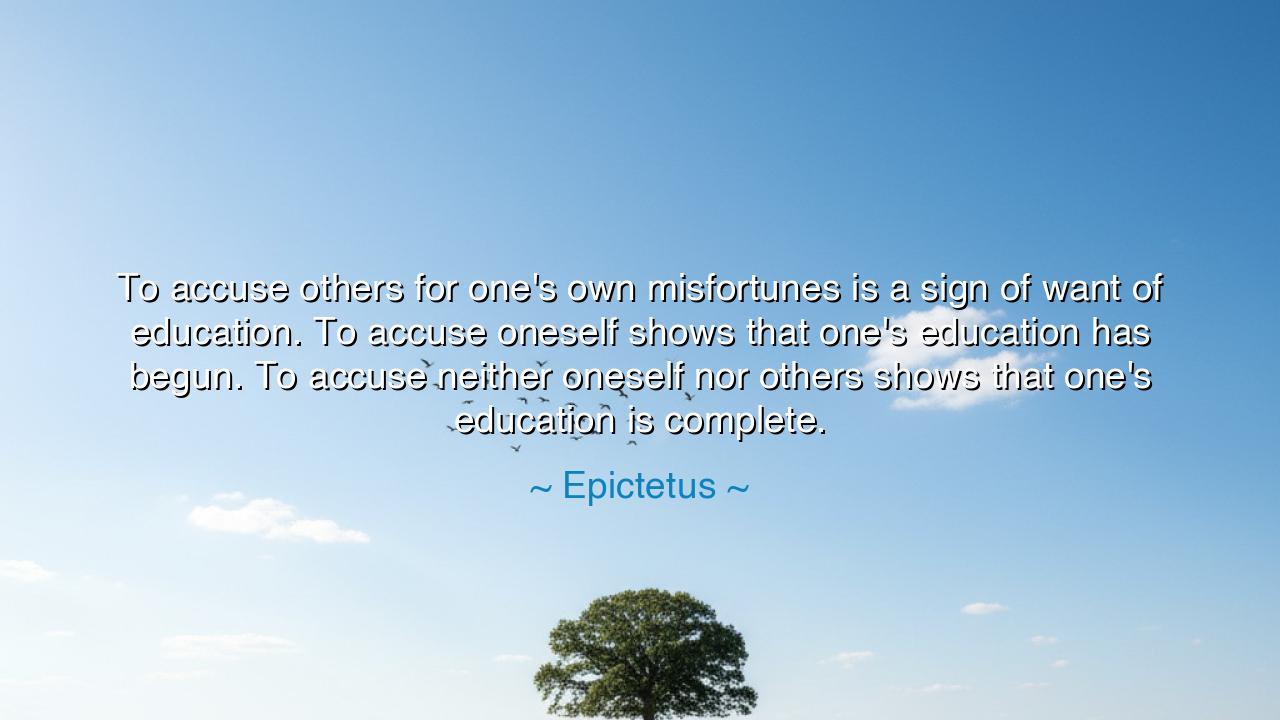
To accuse others for one's own misfortunes is a sign of want of
To accuse others for one's own misfortunes is a sign of want of education. To accuse oneself shows that one's education has begun. To accuse neither oneself nor others shows that one's education is complete.






“To accuse others for one's own misfortunes is a sign of want of education. To accuse oneself shows that one's education has begun. To accuse neither oneself nor others shows that one's education is complete.” Thus spoke Epictetus, the Stoic philosopher born a slave, who rose not by power or wealth but by wisdom. These words, like the ringing of a temple bell, call us to awaken from the sleep of blame and to look upon the true path of growth. For what is education if not the shaping of the soul to see clearly, to endure nobly, and to live in harmony with truth?
In the first stage, the untrained spirit looks outward and sees only enemies. Such a one, when misfortune strikes, cries, “It is the fault of fate, of my neighbor, of the gods themselves!” This is the want of education—the ignorance that refuses to bear responsibility, the blindness that casts shadows on others instead of seeking light within. Like a child who breaks his own toy and blames the heavens, so does the unformed mind squander its strength by railing against the world.
But when the spark of wisdom first stirs, the soul turns inward. The man or woman who has begun the journey of learning says, “Perhaps it is my own choices, my own folly, that have led me here.” This is the second stage: to accuse oneself. It is painful, for it is easier to blame others than to confront our own weakness. Yet this pain is cleansing. Just as a physician cuts away corruption to heal the body, so must the soul admit its own errors if it would be made whole. This is the sign that true education has begun.
Yet there is a higher summit still. When the soul is fully formed in wisdom, it blames neither others nor itself. For it understands that misfortune is the common lot of mortals, that storms strike the righteous and the unrighteous alike, and that suffering is not always punishment, nor blessing always reward. This is the third stage, where the soul rests in peace, accepting fate as it comes, mastering itself and needing no accuser. Here lies the mark of one whose education is complete—not in books or words, but in the deep harmony of the spirit with the order of the cosmos.
Consider the life of Nelson Mandela. Imprisoned for twenty-seven years, he might have spent his soul in bitterness, blaming his captors, railing against his fate. Yet he chose another way. In the early years, he held himself to account, questioning his methods and strengthening his resolve. But in his later wisdom, he ceased to accuse either himself or others. He accepted his suffering as part of a greater path and emerged not with vengeance but with forgiveness. In this, he embodied the fullness of Epictetus’s teaching: that the educated spirit transcends blame, dwelling instead in responsibility, resilience, and peace.
The lesson, then, is this: blame is a chain, whether it is cast upon others or bound around oneself. To live wisely is to rise above the need for blame at all. Instead of asking “Who is at fault?” we must ask, “What can I learn? How can I endure? How may I serve the good even in this trial?” In this lies freedom. For the one who blames is a prisoner of resentment, but the one who accepts is master of himself.
What, then, shall you do? When misfortune comes—and it will surely come to all—pause before accusing others. Resist the easy path of anger. Look first within, with honesty, and see what may be corrected. Then, with time, rise even higher: let go of blame altogether, and meet life’s trials as a soldier meets the battlefield, with steady courage and unshaken resolve. Thus will your soul walk the path from ignorance to wisdom, from slavery to freedom, from the shadows of blame to the light of truth.
So remember Epictetus’s words, not as a riddle of old, but as a living map for your spirit. Accusing others is ignorance. Accusing oneself is the beginning of wisdom. Accusing neither is the crown of wisdom. Walk this path, and you will not only learn—you will be transformed.






AAdministratorAdministrator
Welcome, honored guests. Please leave a comment, we will respond soon